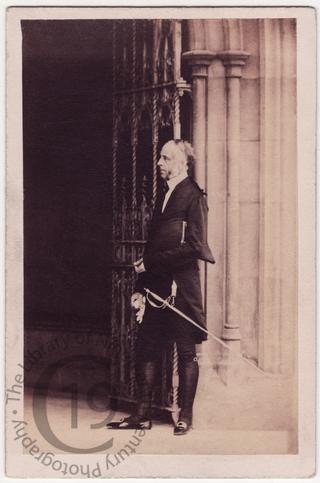
Lord Charles Russell
A carte-de-visite portrait of Lord Charles Russell (1807-1894).
Lieutenant-Colonel Lord Charles James Fox Russell was born on 10 February 1807. He was the son of Sir John Russell, 6th Duke of Bedford and Lady Georgiana Gordon. On 2 April 1834 he marred Isabella Clarissa Davies, daughter of William Griffith Davies and Elizabeth Seymour. He died on 29 June 1894 at the age of 87.
From 1832 to 1848 he was M.P. for Bedfordshire. He held the office of Serjeant-at-Arms to the House of Commons from 1832 to 1875. He gained the rank of Lieutenant-Colonel in the service of the 52nd Regiment. He gained the rank of Lieutenant-Colonel in the service of the Royal Horse Guards.
An extract from an essay in Modern Leaders: Being a Series of Biographical Sketches, published in New York in 1872:
'There was Feargus O'Connor — huge, bolstering, fearless — a burlesque Mirabeau with red hair; a splendid mob-speaker, who could fight his way by sheer strength of muscle and list through a hostile crowd; vain of his half-mythical descent from Irish kings, even when he delighted in being hail fellow well met with tailors and hod-carriers; revelling in the fiercest struggles of politics and the wildest freaks of prolonged debauchery. O'Connor tried to crowd half a dozen lives into one, and the natural result was that he prematurely broke down. For a long time before his death he was a mere lunatic. A strange fact was that as his manners were always eccentric and boisterous, he had become an actual madman for months before those around him were fully aware of the change. In the House of Commons the freaks of the poor lunatic were for a long time supposed to be only more marked eccentricities, or, as some thought, insolent affectations of eccentricity. He would rise while Lord Palmerston was addressing the House, walk up to the great minister, and give him a tremendous slap on the back. One night he actually assaulted a member of the House, and the Speaker ordered his arrest. Feargus sauntered coolly out into the lobbies. The sergeant-at-arms was bidden to go forth and arrest the offender. Lord Charles Russell (brother of Earl Russell), then and now sergeant-at-arms, is a thin, little, feeble man. I have been told by some who witnessed it that the scene in the lobbies became highly amusing. Lord Charles went with reluctant steps about his awful task. At this time everybody was beginning to suspect that O'Connor was really a madman. Anyhow, he was a giant, and at his sanest moments perfectly reckless. Now it is not a pleasant task for a weak and little man to be sent to arrest even a sane giant; but only think of laying hands on a giant who appears to be out of his senses! The dignity of his office, however, had to be upheld, and Lord Charles trotted quietly after his huge quarry. He cast imploring looks at member after member, but it was none of their business to interfere, and they had no inclination ro volunteer. Some of them indeed were deeply engrossed in speculations as to what would happen if Feargus were suddenly to turn round. Would the sergeant-at-arms put his dignity in his pocket and actually run? Or, if he stood his ground, what would be the result? Happily, however, just as Feargus and his unwilling pursuer readied Westminster Hall, the eager eye of Lord Charles Russell descried a little knot of policemen; he hailed them; they came up, and the sergeant-at-arms did his duty and the capture was effected.'
Photographed by Camille Silvy of London in 1860.
Code: 124616




